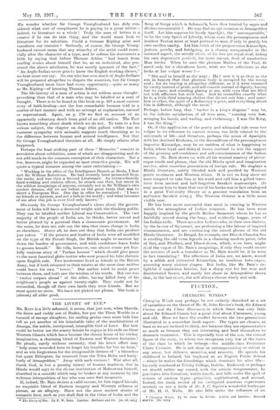THE LIVERY OF EVE.* Bars is a little ashamed, it
seems, that just now, when Skanda, the fierce and ruddy son of Rudra, has put the Three Worlds in a turmoil of savage slaughter, his smiling genius once more bids him tell us yet another of his inimitable tales of the machinations of Ananga, the subtle, incorporeal, intangible God of Love. But how could ho better use the scanty leisure he enjoys in his exile on those Western Chants which have become the chosen home of his tricksy imagination, a charming blend of Eastern and Western fantasies ? Ho pleads, surely without necessity, that his latest effort may " help some wounded hero to forget his troubles for but an hour," and so win forgiveness for the irresponsible dreams of " a blameless but quiet Ethiopian, far removed from the Tohu Bohn and burly- burly of Armageddon." Away with such excuses ! War after all, Shank God, is but a passing misery of human madness, due- (a Hindu would say) to the divine inattention of Maheawara himself, absorbed in a samadhi which may be broken at any moment by the welcome interposition of her who was once Sati incarnate.
If, indeed, Mr. Bain desires a valid excuse, let him regard his tale, an exquisite blend of Eastern imagery and Western richness of phrase, as an allegory. Have not the most. ancient stories of romantic love, such as you shall find in the Gitas of India and the * The Livers of Eve. By P. W. Bain. Landon: Methuen and Co. [3s. ad. net.] Song of Songs which is Solomon's, been thus treated by sages and divines innumerable ? He may find an apt occasion in Armageddon itself. Let him suppose his lovely Aparajita, the " unconquerable," to be the very Spirit of Liberty, whom even the presumptuous and insolent Teuton must at least pretend to woo, if only to gratify his own swollen vanity. Let him think of the preposterous Kimarlipa, jealous, greeds-, and intriguing, as a clumsy masquerader in the outward aspect, tho seemly Skriti, of his free yet royal rival, hiding his own degenerate prakriti, his inner nature, fruit of numberless Hun births'. When he sues the glorious Maiden of the Pool, fit mead only for a chivalrous lover, what are her reflections as she looks at her vulgar wooer ?-
" She said to herself as she wept : Ha ! now it is as clear as the sun in heaven that that glorious body is occupied by the wrong soul ; for its bearing is altogether different, as if it were tenanted by vanity instead of pride, and self-conceit instead of dignity, having lost its caste, and standing glaring at me, with eyes that are filled not with affection but with lust. And ho resembles exactly what he is, a little thief wearing clothes that do not suit him ; and some- how or other, the spirit of a Kshatriya is gone, and everything about him is different, although the same."
Perhaps, before long, that " barber in a king's disguise " may be, to the infinite satisfaction of all true mon, " running very fast,
wringing his hands, and wailing, and exclaiming : I was the King, I was tho King."
Or, if this application of the pretty and whimsical tale seem too vulgar in its reference to current events, too little related to the universals of life—and literature, perhaps the union of Apariijitii with her destined Keshawa, to the discomfiture of the presumptuous impostor Kiimarima, may be an emblem of what. is happening in India, where loyal and disloyal forces contend to win the support of the growing self-confidence and self-consciousness of the Indian masses. Mr. Bain shows us, with all his wonted mastery of pictur- esque simile and phrase, that the old Hindu spirit and imagination survive, after countless generation's of foreign rule. He displays a Hindu literature, subtly blended with and purified by Western poetic sentiment and Western ethics. It is not so long since wo were tempted to take him at his word and call him a gifted trans- lator from ancient and half-forgotten Sanskrit manuscripts. (It may amuse him to learn that one of his books was in fact catalogued in a great 'University library as a genuine translation from an authentic Sanskrit story.) The Western element is a little more visible now.
He has been more successful than most in creating in Western minds the atmosphere of Indian romance. Ho has been most happily inspired by the gentle Mother Saraswati whom ho has so faithfully served during the busy, and evidently happy, years of his Indian exile. There aro a few Indians who, in their own dialects, by the favour of Saraswati, are performing a like labour of inspired transmutation, and are vindicating the mixed glories of the old Hindu literature. In Bengal, for example, one Dinesh Chandra Son is retelling the old verse legends in a charming modern prose, tales of Sati, and Phullark, and Dharii-drona, which, even hero, might rival the vogue of Mr. Bain's imaginings, if only they could secure the services of such a translator as Mr. Bain would be, if ho wore in fact translating ! The affections of India are, we know, wooed by a selfish and interested Kitmarilpa, an insidious bahu-rn pin, assuming many sinister shapes. But India, like Mr. Bain's de- lightful if capricious heroine, has a sharp eye for her true and disinterested lovers, and surely her share in Armageddon shows that, in the last resort, she will always choose wisely and well.


























 Previous page
Previous page